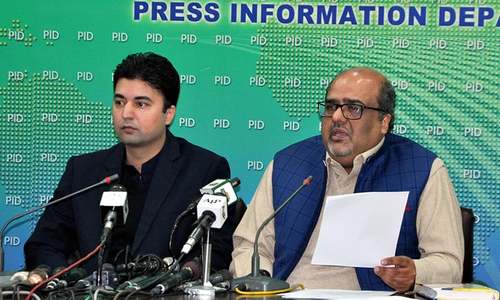ISLAMABAD: The performance of the National Accountability Bureau (NAB) came under a cloud when the Supreme Court on Tuesday asked why the anti-graft watchdog sent suspects to jail first and then started looking for evidence.
“Why can’t NAB first complete a reference after the collection of evidence and then take the accused into its custody,” wondered Justice Mushir Alam.
The observation came during the hearing of a bail application moved by Faisal Kamran Qureshi, an accused in a fraud case. Other members of the bench were Justice Mazhar Alam Khan Miankhel and Justice Syed Mansoor Ali Shah.
Faisal Qureshi was arrested by NAB in April 2019 for allegedly defrauding innocent people to the tune of Rs33 million by acting as a broker. He opened two franchises in Joharabad in the name of a Karachi-based company, Access Global. His wife Sehrish Kamran is a co-accused in the case.
NAB filed a reference in an accountability court against the accused last month. Raj Kumar, another co-accused and owner of Access Global, has already opted for plea bargain after furnishing Rs16.6m.
Wonders why anti-graft watchdog sends suspects to jail first and then looks for evidence
When the case was taken up on Tuesday, Justice Alam wondered why NAB never expedited and completed procedures like holding inquiry and collecting evidence against the accused.
NAB special prosecutor Imranul Haq explained that the bureau always took the accused into custody to prevent any attempt by the accused to tamper with the records. A formal reference had already been furnished before the relevant accountability court and the bureau would try it its level best that the trial was completed as early as possible, he assured the SC bench.
The court, however, disposed of the matter after the accused withdrew his bail petition, though he pleaded that he had faced a similar charge and that he had already paid the due amount — a claim denied by NAB.
On Dec 3, NAB withdrew a set of appeals after it failed to convince the Supreme Court that former Punjab chief minister Shahbaz Sharif had abused his authority in the Ashiyana-i-Iqbal Housing Scheme. Senior counsel Naeem Bokhari, representing the NAB chairman, had pleaded before the apex court, headed by then chief justice Asif Saeed Khosa, that he wished not to press for the three appeals against the Feb 14 Lahore High Court order granting bail to Shahbaz Sharif in the housing scheme scam and his April 10 bail in the Ramzan Sugar Mills case.
The apex court had then also confirmed the bail of Munir Zia, one of the directors of Bismillah Engineering Services Company, with an observation that the intended arrest smacked of bad faith.
The apex court had regretted that the Ashiyana housing project, which on grounds never happened, had kept the courts quite busy. It also granted bail to the housing scheme’s project director Bilal Qidwai on surety bonds of Rs1million each and confirmed the bail of Sajjad Bhutta, the executive director of Paragon City.
Likewise in November last year, Islamabad High Court Chief Justice Athar Minallah had observed that the powers to arrest provided under the National Accountability Ordinance 1999 were neither unfettered nor could they be exercised mechanically and in an arbitrary manner. “This is a classic example of the violation of fundamental rights,” he had observed in a detailed judgement issued on the post-arrest bail of former managing director of Pakistan State Oil Sheikh Imranul Haq in the LNG terminal case.
In the same case, former prime minister Shahid Khaqan Abbasi is behind bars and former finance minister Miftah Ismail is on bail.
In the judgement, the IHC chief justice had observed: “The violation of fundamental rights guaranteed under the Constitution and the excess or abuse of jurisdiction and powers vested in NAB in depriving a citizen of the valuable right of liberty in an arbitrary manner cannot be ignored…the ouster of the bail provisions in the Ordinance of 1999 does not deprive the petitioner or any other accused of constitutionally guaranteed fundamental rights such as inviolability of dignity and freedom of movement provided under Article 14 and 15 of the Constitution.”
Pointing out lack of expertise in probing the white-collar crime, the high court had observed that in several cases investigations were not carried out by the expert fraud examiners or investigators or data mining experts.
Published in Dawn, January 8th, 2020















































